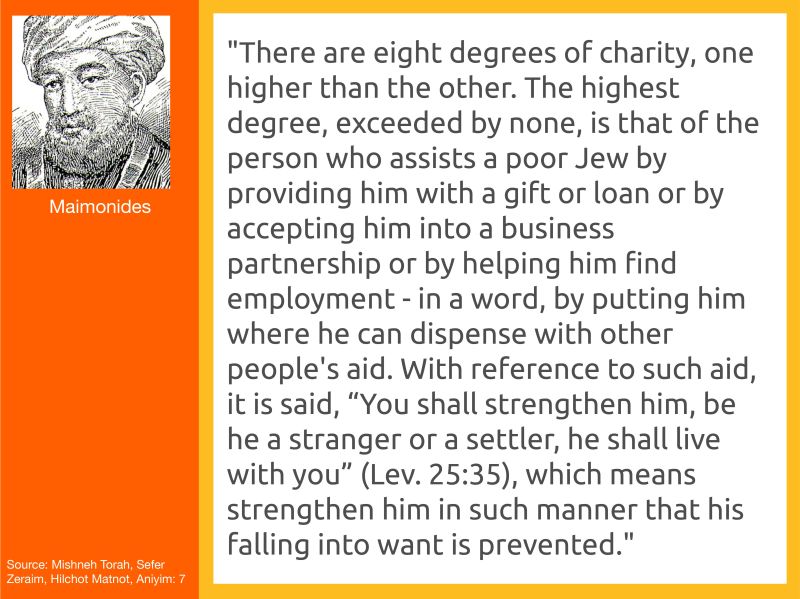10th May 2012 | By Maimonides
Maimonides offers one of the most important accounts of how we reconcile charity and justice in practice.

Level One - There are eight levels in charity, each level surpassing the other. The highest level beyond which there is none is a person who supports a Jew who has fallen into poverty [by] giving him a present or a loan, entering into partnership with him, or finding him work so that his hand shall be fortified so that he will not have to ask others [for alms]. Concerning this [Leviticus 25:35] states “You shall support him, the stranger, the resident, and he shall live among you.” Implied is that you should support him before he falls and becomes needy.
Level Two - A lower level than this is one who gives charity to the poor without knowing to whom he gave and without the poor person knowing from whom he recieved. For this is an observance of the mitzvah for its sake alone. This [type of giving] was exemplified by the secret chamber that existed in the Temple. The righteous would make donations there in secret and poor people of distinguished lineage would derive their livelihood from it in secret. A level close to this is giving to a charity fund. A person should not give to a charitable fund unless he knows that the person managing it is faithful, wise and capable of administering it in a proper manner as Rebbe Chananya ben Tradyon was.
Level Three - A lower level than this is an instance when the giver knows to whom he is giving, but the poor person does not know from whom he received. An example of this were the great Sages who would go in secret and money into the doorway of the poor. This is an appropriate way of giving charity and it is as good a quality if the trustees of the charitable fund are not conducting themselves appropriately.
Level Four - A lower level than this is an instance when the poor person knows from whom he took, but the donor does not know to whom he gave. An example of this were the great Sages who would bundle coins in a sheet and hang them over their shoulders and the poor would come and take them so they would not be embarrassed.
Level Five - A lower level than that is giving the poor person in his hand before he asks.
Level Six - A lower level than that is giving him after he asks.
Level Seven - A lower level than this is giving him less than what is a appropriate, but with a pleasant countenance.
Level Eight - A lower that that is giving him with sadness.
Maimonides from the Mishneh Torah, Sefer Zeraim, Hilchot Matnot, Aniyim 7-14
This important analysis of the demands of social justice should be given to all students of social policy, political theory and theology. For it sets out more clearly than anything else I know the real challenge of charity and social justice.
We forget that many society's before the welfare state have figured out systems of mutual care and support. For instance, Jewish society had a long history of making social justice part of the institutions of agriculture, work, religion and society. Moreover, as Maimonides shows, Jewish thinking has been particularly sensitive to the need to ensure that charity is always an act of justice - not patronage.
Another way to read Maimonides is in reverse - the quality of giving improves to the point that the act of giving becomes utterly invisible:
In other words we ascend to that point where there is no sense of weakness, vulnerability and dependence. The gift is still there - but it is absorbed into everyday life in a way that feels rightful and proper to both.
To my mind our efforts to create a system of universal entitlements, without stigma, in order to reform the current welfare state are probably analogous to Level 2 giving. Such a system would not be necessary in a society where everybody already had enough and where mutual exchange and support were natural and universal. But we are not that society. We live in a time of great inequality and for most people the economy offers little fundamental security. Most of us do not own land we can rent, have savings or a guaranteed income. Our securities are collective and guaranteed through democratic politics - for better or worse.
Those who seek to dissolve rights in the name of charity have not paid attention to the fundamental questions of human dignity, respect and equal citizenship which is at the heart of social justice - "you should support him before he falls and becomes needy."